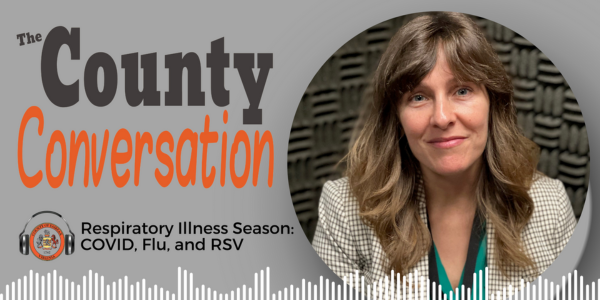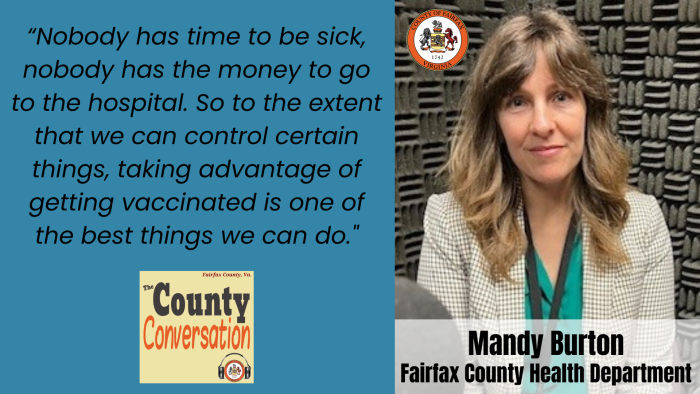
As the warm weather of summer winds down and fall approaches, health officials in Fairfax County are reminding residents to prepare for respiratory illness season.
On a recent edition of the “County Conversation” podcast, Mandy Burton, a respiratory epidemiologist with our Health Department, discussed how COVID-19, flu and respiratory syncytial virus (RSV) are expected to increase in the coming months, making vaccination and prevention strategies more important than ever.
COVID-19 Cases Rising
Fairfax County is currently experiencing a summer wave of COVID-19 cases. Burton explains that this pattern is not unusual.
“Over the past five or six weeks, we’ve kind of seen a slow increase in the percent of emergency care visits and urgent care visits and emergency department visits of people who are diagnosed with COVID,” Burton said. “So, we’re definitely seeing an increase in Covid activity.”
This summer surge happens for several reasons. Protection from fall vaccines begins to wear off, new variants may be circulating and people are traveling and gathering more frequently during summer months.
Annual Vaccination Recommended
Like the flu shot, COVID-19 vaccination is now recommended annually for eligible people. The vaccine provides the strongest protection in the first four to six months after getting the shot.
“Getting vaccinated every year is recommended,” Burton explained. “And then also it can help because, every year, kind of like flu, we have different variants that are out there, and the vaccine manufacturers will tailor the dose each year to whatever variants are currently circulating.”
This year’s COVID vaccine rollout has been different from previous years. The FDA approved the vaccine first with some limitations, while health officials wait for CDC recommendations. People 65 and older are specifically recommended to get vaccinated, while those under 65 can get the vaccine if they have certain health conditions that put them at higher risk.
Flu and RSV Season Approaching
While COVID cases are currently elevated, flu and RSV activity remains low. However, that will change as weather gets colder and people spend more time indoors.
September and October are the best times to get flu vaccines. The recommendation is simple: everyone 6 months and older should get a flu shot. COVID and flu vaccines can be given during the same visit, though they require separate shots.
RSV vaccines are targeted to specific groups who face the highest risk of severe illness. These include:
- People 75 and older
- People 50-74 with chronic health conditions
- Pregnant women between 32-36 weeks of pregnancy during September through January
- Babies born to mothers who didn’t get the RSV vaccine during pregnancy

Simple Prevention Steps Work
Beyond vaccination, the same basic prevention methods work for all respiratory illnesses:
- Wash your hands frequently
- Cover coughs and sneezes
- Stay home when sick until 24 hours after your last fever (without fever-reducing medication) and 24 hours after feeling better
- Consider wearing a mask when returning to work or school after illness
- Improve air circulation by opening windows or using fans
Understanding the Risk
Some people question whether vaccines are worth getting, especially if they’ve been vaccinated and still gotten sick. Burton uses a helpful comparison to explain vaccine benefits.
“I like to think of a vaccine in some ways, like a seatbelt. We put it on; it doesn’t prevent us from getting in a car crash. So, it’s not going to prevent us from getting sick. But one thing it’s really great at is preventing us from getting really severe illness, hospitalization, death.”
Tracking Local Trends
Fairfax County maintains a Respiratory Illness Dashboard that residents can use to monitor local disease activity. The dashboard updates every Tuesday and shows current levels of respiratory illness activity using a gauge system from minimal to very high. It includes separate tabs for COVID, flu and RSV trends, plus information about outbreaks in schools and other facilities.
Getting Vaccinated
People with insurance can get vaccines from their health care providers or local pharmacies. Many pharmacies offer flu shots, and some may provide them free of charge.
For residents without insurance, the Health Department provides vaccines for those who qualify, including people eligible for Medicaid and other vulnerable populations.
For more information, visit the Health Department's webpage.
The County Conversation Podcast
The “County Conversation” is a podcast featuring employees and subject matter experts from the Fairfax County Government discussing programs, services and items of interest to residents of Fairfax County. Listen to past episodes of “County Conversation." To find other county podcasts, visit www.fairfaxcounty.gov/podcasts.



 SIGN UP FOR DAILY EMAIL HEADLINES
SIGN UP FOR DAILY EMAIL HEADLINES